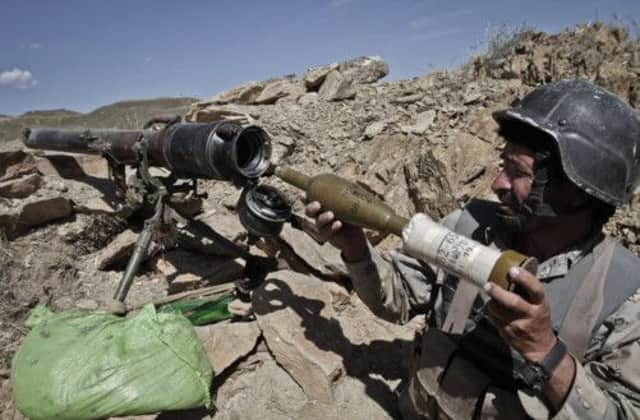Afghans demand US support in exchange for bases


Washington has made no final announcement about how many troops might remain in Afghanistan after 2014, although sources have indicated as many as 12,000 US and coalition forces could stay to train and advise Afghans and continue counterterrorism operations against al-Qaeda and other extremists.
Mr Karzai has made many statements about the issue but gave his first specific statement about bases at a ceremony at Kabul University yesterday. “We are giving the bases, nine bases they want from Afghanistan in all of Afghanistan,” he said.
Advertisement
Hide AdAdvertisement
Hide AdBut in return, Afghanistan wants a US commitment to boost its security, strengthen its armed forces and promise long-term economic development.
“It is our condition that they bring security and bring it quickly and strengthen the Afghan forces and the economy,” he said. “When they [the US] do this, we are ready to sign” a partnership agreement.
The US Embassy spokesman in Kabul, David Snepp, declined to discuss details of the agreement, citing a policy of not commenting on specifics during the ongoing negotiations.
“However, as President Obama has stated, the US does not seek permanent military bases in Afghanistan. We envision that the Bilateral Strategic Agreement will address access to and use of Afghan facilities by US forces in the future,” he said.
A senior US diplomat official familiar with the talks said that Washington and Mr Karzai are at odds over his request that the United States guarantee it would side with Afghanistan if neighbouring Pakistan poses a threat. So far the US is refusing any such undertaking.
The negotiations over a strategic agreement have been protracted and at times acrimonious, reflecting Washington’s relationship with Mr Karzai, who has often had strong words of criticism for Washington.
In March, when it appeared that the agreement was about to be signed, Mr Karzai made a statement that suggested that the US and the Taleban were benefiting each other and even in collusion to keep US troops in the country, though America has been fighting Taleban insurgents in Afghanistan for two decades. As a result, the US put the agreement on hold.
Afghan sources say Mr Karzai’s tough talk is a negotiating ploy to get more from the US, particularly in relation to neighbouring Pakistan. Tensions between the two countries have escalated dramatically in the last two weeks, with both sides accusing each other of unprovoked cross-border attacks.
Advertisement
Hide AdAdvertisement
Hide AdDuring his speech marking the 80th anniversary of Kabul University, Mr Karzai warned Pakistan against sending its forces across the border or trying to force Afghanistan to accept the disputed Durand partition line – the 19th century demarcation between present day Afghanistan and Pakistan – as the international border.
“We want a civilized relationship with Pakistan but if any neighbour wants Afghanistan under its shadow … it is not possible,” said Mr Karzai. “If there is any attack or any violation to force Afghanistan to accept the Durand Line, the Afghan nation will never accept it and will never recognise the Durand Line. Impossible.”
The Durand Line is a 1893 British demarcation arbitrarily dividing the area between Afghanistan and what was then British-ruled India. Pakistan was created in 1947 when British rule of the subcontinent ended. The line has served as the border between the nations ever since.
Historically, the relationship between Afghanistan and Pakistan has been uneasy. Pakistan was one of only three countries to recognise the Taleban regime and was its major supporter until the 11 September, 2001 terrorist attacks on the US, when it did a U-turn and joined the coalition to remove the Taleban from power.